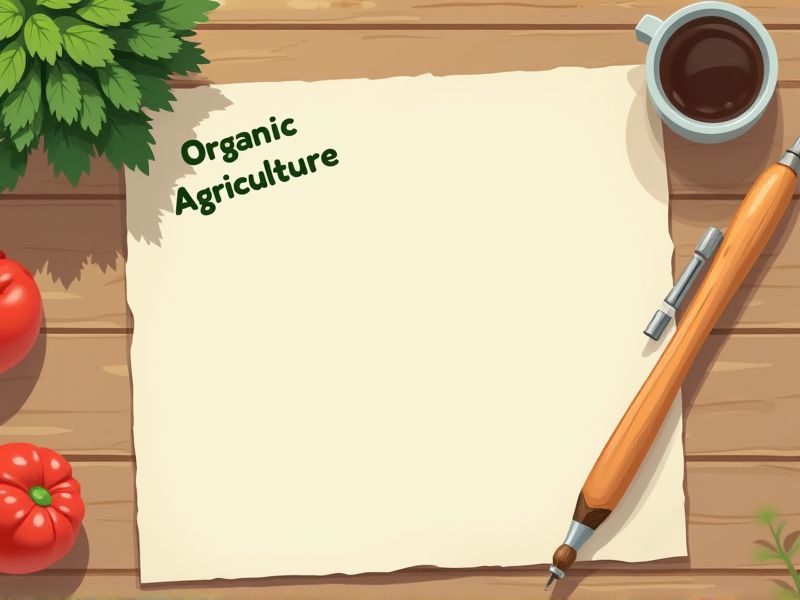
Organic Agriculture Certification Inspectors need specific certifications to ensure credibility and competence in their roles. Certifications validate their understanding of organic farming practices, policies, and standards. They also demonstrate the inspector's ability to assess compliance accurately while safeguarding organic integrity. Here are some important certifications you may need for becoming an Organic Agriculture Certification Inspector.
Certified Organic Inspector (COI) Certification
Certified Organic Inspector (COI) Certification ensures inspectors possess comprehensive understanding of organic standards and regulations. Rigorous training provided by the certification enhances skill in accurately assessing whether farming practices meet organic criteria. Certification standardizes inspection processes, reducing discrepancies and enhancing the credibility of organic certifications. Possession of COI certification signifies professionalism and commitment to maintaining organic integrity in the agricultural sector.
USDA Organic Certification Training
USDA Organic Certification Training provides essential knowledge on organic standards and regulations, ensuring inspectors can accurately assess compliance. Inspectors learn about the latest practices in organic agriculture, which is crucial for maintaining consistency in certification processes. The training equips inspectors with skills to effectively communicate and document findings, reducing discrepancies and errors. Proper training helps maintain the integrity of organic labeling, which is critical for consumer trust and market stability.
IFOAM-EU Organic Inspector Accreditation
The IFOAM-EU Organic Inspector Accreditation ensures that inspectors have the necessary qualifications and expertise to assess organic farming practices effectively. A standardized accreditation process minimizes discrepancies in organic certification, leading to consistent certification outcomes. It also enhances trust among consumers who seek reassurance that organic labels authentically reflect organic practices. As global demand for organic products rises, this accreditation supports international trade by aligning inspection standards across borders.
GlobalG.A.P. Certification Inspector Training
GlobalG.A.P. certification inspector training is essential because it equips inspectors with a thorough understanding of international safety and sustainability standards necessary for organic agriculture. This training ensures that inspectors can accurately evaluate and verify compliance with these rigorous criteria, fostering consumer trust in organic products. As organic agriculture grows globally, inspectors must be adept at identifying and mitigating potential non-compliance scenarios. Moreover, trained inspectors contribute to the credibility and consistency of organic certifications, promoting fair trade and market access worldwide.
ISO 17065 Accreditation Training for Certification Bodies
ISO 17065 Accreditation Training ensures that certification bodies maintain consistent and reliable assessment processes for organic agriculture. The training enhances the credibility and trustworthiness of inspectors by equipping them with standardized knowledge and skills. Consistent application of organic certification standards protects consumers by ensuring products are genuinely organic. Training reduces the risk of errors in certification, which can have significant economic implications for producers and markets.
HACCP Food Safety Certification
HACCP Food Safety Certification equips Organic Agriculture Certification Inspectors with a systematic approach to identify and manage food safety risks. This proficiency enhances their ability to ensure that organic produce meets stringent safety standards. Having HACCP certification can increase trust and credibility within the organic agriculture industry. It aligns inspection practices with international food safety regulations, facilitating global trade and market access.
Certified Crop Advisor (CCA)
Certified Crop Advisors (CCAs) provide crucial expertise in nutrient management and soil health, which are fundamental for organic farming practices. Their understanding of sustainable agricultural techniques assists Organic Agriculture Certification Inspectors in evaluating compliance with organic standards. CCAs offer objective insights into pest management strategies compatible with organic certification requirements. Their knowledge of crop rotation and biodiversity enhances the effectiveness of organic inspections, ensuring adherence to ecological agricultural methods.
Organic Systems Certification Standard (OSCS) Training
Organic Systems Certification Standard (OSCS) Training ensures inspectors understand the nuances of organic farming practices, facilitating accurate certification processes. Without this training, there is an increased risk of non-compliance and misinterpretation of organic standards, which can undermine the integrity of certified organic products. This training provides inspectors with the skills necessary to assess and verify that agricultural operations meet stringent organic criteria. Enhanced knowledge from OSCS Training strengthens the credibility of organic certifications and supports consumer trust in organic labels.
Sustainable Agriculture Professional Certification
Sustainable Agriculture Professional Certification equips inspectors with comprehensive knowledge of eco-friendly farming practices, enhancing the credibility of organic certification assessments. The certification ensures inspectors understand the intricate balance between farming and environmental impact, crucial for accurate evaluations. It also bridges the gap between theoretical principles and practical application, ensuring inspections are thorough and reliable. The certification boosts trust among stakeholders, as it assures them that inspections align with global sustainability standards.
ISO 14001 Environmental Management Systems Certification
ISO 14001 Environmental Management Systems Certification ensures that Organic Agriculture Certification Inspectors adhere to internationally recognized environmental management standards. By adopting these standards, inspectors can more effectively evaluate farming practices' sustainability and compliance. Certification helps build trust with stakeholders, as it demonstrates the inspector's commitment to environmental responsibility. This alignment with ISO 14001 enhances the credibility and global acceptance of organic certifications.
Summary
As an Organic Agriculture Certification Inspector gains certifications, you may notice an improvement in their credibility and trustworthiness among stakeholders. This enhanced expertise can lead to more rigorous and consistent inspection processes, ensuring higher compliance with organic standards. Consequently, organic producers may experience an elevation in product quality, which could bolster consumer confidence and satisfaction. The broader agriculture industry might also witness a shift towards sustainable practices as certified inspectors promote better environmental stewardship.
